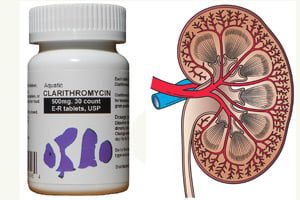
Older adults taking both a calcium channel blocker and the antibiotic, clarithromycin, may experience an increased risk of acute kidney injury. According to a new study being published online early to meet up with its presentation at the American Society of Nephrology’s Kidney Week 2013, the small but statistically significant 30-day increased risks of hospitalization […]
 Older adults taking both a calcium channel blocker and the antibiotic, clarithromycin, may experience an increased risk of acute kidney injury.
Older adults taking both a calcium channel blocker and the antibiotic, clarithromycin, may experience an increased risk of acute kidney injury.
According to a new study being published online early to meet up with its presentation at the American Society of Nephrology’s Kidney Week 2013, the small but statistically significant 30-day increased risks of hospitalization over acute kidney injury was seen in clarithromycin with calcium channel blocker use, when compared to azithromycin, wrote Medical Xpress.
Clarithromycin and erythromycin are considered clinically important inhibitors of the CYP3A4 enzyme; azithromycin is less of an inhibitor of this enzyme, according to Medical Express. CyP3A4 metabolizes calcium channel blockers; blood concentrations of calcium channel blockers may increase to dangerous levels when the activity of CYP3A4 activity is inhibited, Medical Xpress reported.
“Currently, the U.S. Food and Drug Administration warns that ‘serious adverse reactions have been reported in patients taking clarithromycin concomitantly with CYP3A4 substrates, which includes hypotension with calcium-channel blockers metabolized by CYP3A4.’ Yet, calcium-channel blockers and clarithromycin continue to be frequently co-prescribed in routine care,” background information in the article indicated.
In patients diagnosed with hypotension, the kidney become vulnerable to injury from poor circulation according to Medical Xpress. “Despite this knowledge, the risk of acute kidney injury following co-prescription of clarithromycin with a calcium-channel blocker is unknown,” the authors wrote.
Sonja Gandhi, B.Sc., of Western University, London, Canada, and colleagues researched the relationship between calcium channel blockers (amlodipine, felodipine, nifedipine, diltiazem, or verapamil) and the antibiotic clarithromycin, compared with azithromycin. The team focused on acute kidney injury in people who were an average age of 70, according to Medical Xpress. Amlodipine was the most commonly prescribed calcium channel blocker, and was prescribed to more than half of the patients.
The study revealed that co-prescribing clarithromycin with a calcium-channel blocker was tied to an increased risk of hospitalization with acute kidney injury (.44 percent) when compared with co-prescribing azithromycin (0.22 percent). This translates to a 0.22 percent increased risk of hospitalization with acute kidney injury, Medical Xpress reported.
The risk of hospitalization with acute kidney injury was highest among patients co-prescribed clarithromycin with nifedipine. Co-prescription of a calcium-channel blocker with clarithromycin was also tied with an increased risk of hospitalization with hypotension. “Although the absolute increases in the risks were small, these outcomes have important clinical implications. Our results suggest that potentially hundreds of hospitalizations and deaths in our region may have been associated with this largely preventable drug-drug interaction. This burden on the health care system, given the high costs of managing acute kidney injury, might have been avoided,” the authors write, according to Medical Xpress.
The researchers suggest ceasing the calcium channel blocker during clarithromycin therapy or choosing a non-CYP3A4 inhibiting agent, Medical Xpress reported.
According to the Mayo Clinic, calcium channel blockers—also known as calcium antagonists—are prescribed for an array of conditions, including high blood pressure, migraines, and Raynaud’s disease. The drugs include:


